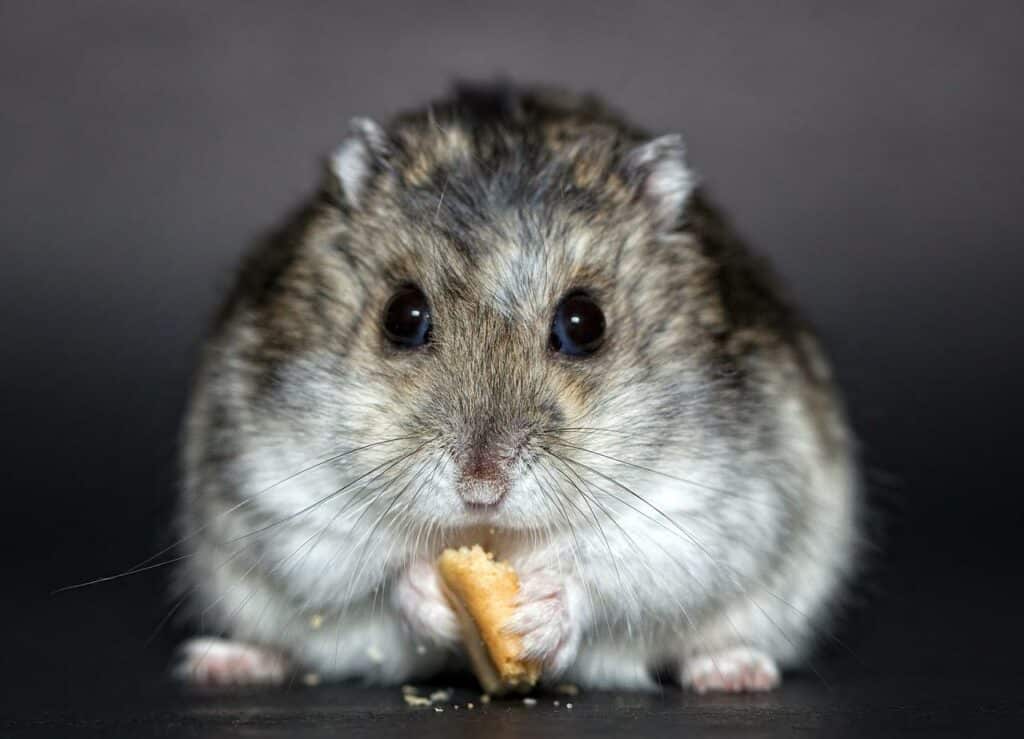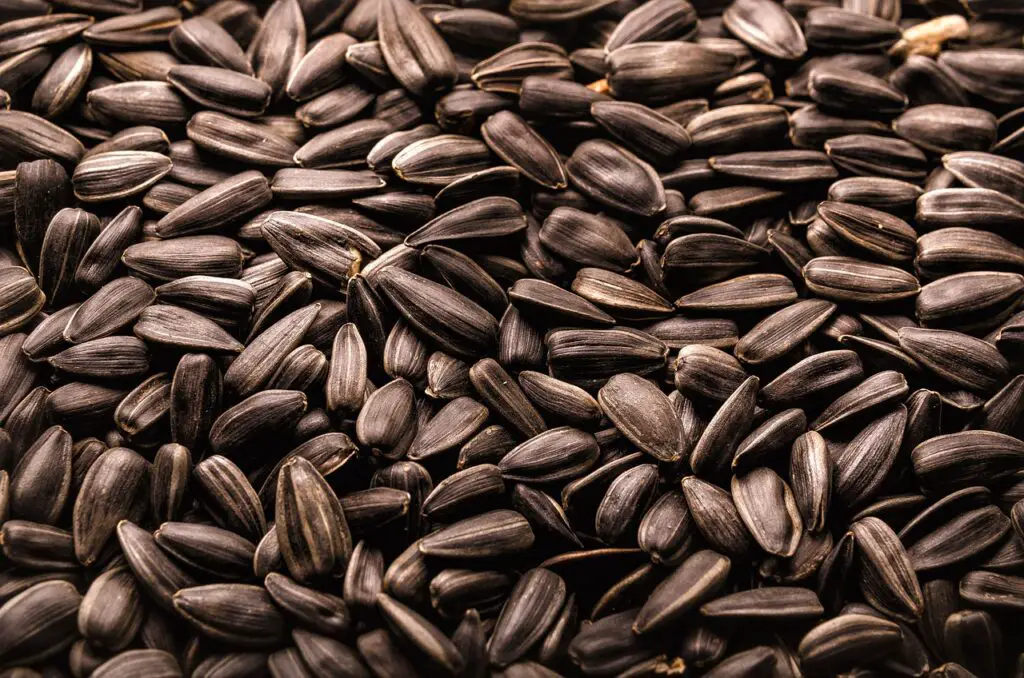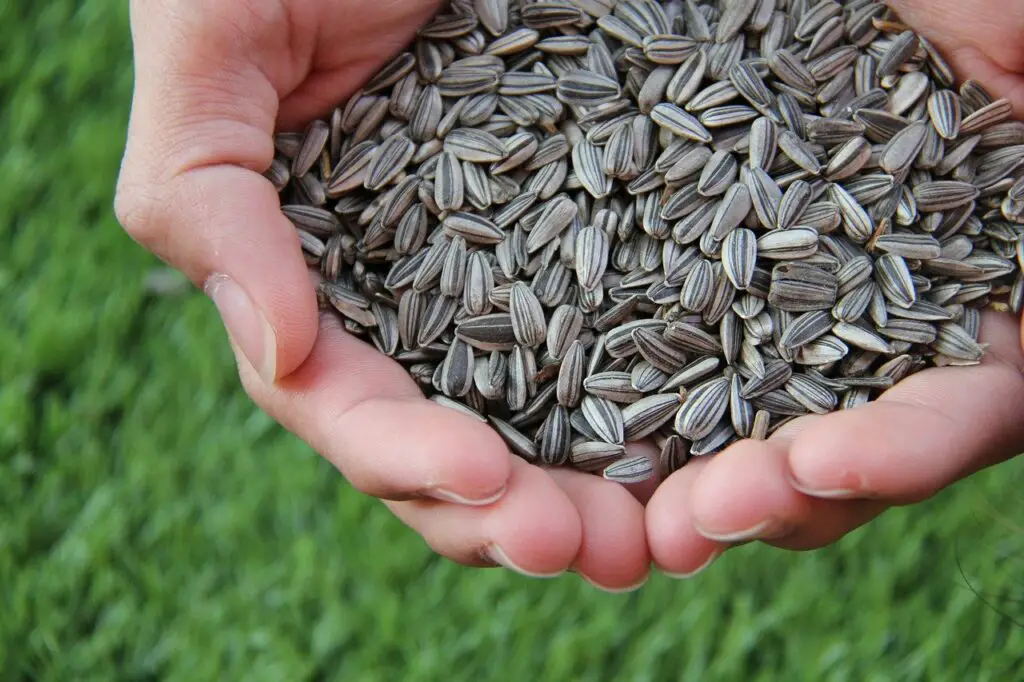The image of a hamster holding a sunflower seed with his tiny hands and nibbling at it is cute.
It’s quite endearing to watch as your pet munches on the seeds.
Seeing how much your furry friend enjoys them, you may be tempted to add more flavor by salting the seeds.
But, can hamsters eat salted sunflower seeds?
Salted sunflower seeds are not recommended for your hamster.
Salt strains your little hammy’s body causing fatal results that can lead to death.
The salts absorb the water from your pet’s body leading to dehydration and kidney stones.
To keep your hamster safe, he should only eat saltless and unseasoned sunflower seeds, preferably shelled.
Let’s dig deeper into what to do if your furry friend ingests salted sunflower seeds, their benefits, and how best to serve them.

Risks of feeding your hamster salted sunflower seeds
Dehydration
Too much salt sucks up the water in your hamster’s body, leaving your fur buddy dehydrated.
Kidney stones
Excessive salt puts pressure on your hammy’s kidneys which may lead to kidney stones.
High sodium levels
Table salt, commonly used to season food, can harm a hamster.
The salt is usually refined and stripped of impurities, leaving it with a higher sodium content than Himalayan or Celtic salt.
Table salt also has additives like magnesium carbonate, which prevents caking.
Feeding your hamster too many salted sunflower seeds may also have the following effects:
Obesity
Sunflower seeds contain lots of fats; thus, the need to feed your hamster the recommended amount depends on breed and size.
Too many seeds lead to obesity and diabetes, reducing your pet’s lifespan.
Diarrhea
Sunflower seeds have vitamin C, which affects your hamster’s stomach when ingested in large quantities.
Too much vitamin C in your pet’s system can cause diarrhea.
Lack of a balanced diet
If your hamster ingests too many seeds, they will be full and will not have room for a properly balanced diet.
If this occurs consistently, it can lead to malnutrition.

What to do if your hamster ingests salt
- If your hamster ingests a lot of salt, rehydration then becomes crucial. Ensure your hamster has a clean supply of drinking water.
- A watery vegetable can also help reverse the effects of dehydration. Give the hamster a succulent cucumber or a juicy apple to chew.
- Contact your veterinarian for further intervention and advice.
Nutritional value of sunflower seeds
Hamsters are tiny creatures and should therefore eat sunflower seeds in moderation.
The number of seeds a hamster can eat depend on the breed.
Controlled feeding is important to avoid the risk of obesity in your small furry friend.
Syrian hamsters, the largest, can have up to four sunflower seeds in a day, while Robo hamster, which is mid-sized, can only have a maximum of two seeds daily.
The Dwarf hamster, the smallest of them all, can only have one sunflower seed in two or three days.
When fed appropriately, sunflower seeds are a great snack with major health benefits for your pet.
The minerals and nutrients present in sunflower seeds include:
Vitamin E: This vitamin is an antioxidant. It ensures your hammy has good eyesight and great, healthy skin.
Vitamin C: This is crucial for the healing process. A deficiency in vitamin C causes scurvy in hamsters. Symptoms include lethargy, loss of fur, weight loss, and weakness.
Iron: This mineral maintains good health and boosts proper blood flow.
Potassium: Boosts your hamster’s heart and kidney health and functions and your pet’s overall wellbeing.
Magnesium: This helps keep your fur buddy’s blood pressure regulated.
Calcium: This mineral promotes good health for your hamster’s bones and teeth.
How to best give sunflower seeds to your hamster
It’s best to feed your hamster sunflower seeds after a meal so they don’t feed on too much and fail to eat the main meal.
This will ensure your pet benefits from a wholesome meal.
Your hammy can have either shelled or unshelled sunflower seeds.
The shelled are, however, better as they keep your pet active and busy.
Your pet’s process of unshelling helps improve their dental health.
Hamsters need to gnaw on hard material to maintain their teeth.
Wash the seeds before feeding them to your furry friend to eliminate any traces of pesticides and dirt.

Frequently asked questions
Is salt lick safe for hamsters?
Many hamster owners give their pets salt licks.
Hamsters don’t need salt lick as too much salt is harmful.
Your furry friend can also end up biting off chunks of the salt block and ingesting too much, which isn’t advisable.
What other foods can hamsters eat?
Besides store-bought food, hamsters can enjoy nuts, seeds, and vegetables like kale and broccoli.
Hamsters also love gnawing on dried fruit.
Can a hamster get sodium deficiency?
Yes.
A hamster can suffer from a lack of enough iodine in the body.
However, your furry friend gets enough from a well-balanced diet of fruits, vitamins, and grains.
Always ensure that the food is plain, without any seasoning or additives.
Does washing salted sunflower seeds get rid of the excessive sodium?
No.
The salt has already been absorbed in the seeds, and washing them can only reduce the salt content but not eliminate it.
Can my hamster have salted or unsalted roasted sunflower seeds?
It’s best not to give your hamster salted sunflower seeds.
Even after shelling, some of the salt has been absorbed into the seeds and can be a potential danger.
Roasted sunflower seeds are also not a good snack for your pet as they lose their nutritional value.
If your hamster eats roasted sunflower seeds, it will risk becoming obese without getting any nutritional value.
Conclusion
Sunflower seeds are one of the best desserts your little pet can enjoy as it compliments your hamster’s main diet.
Your hamsters can now enjoy unsalted sunflower seeds in the recommended quantity.
Sunflower seeds are a nutritious addition to your pet’s diet, but the benefit is only achieved when fed in moderation.
- What Dog Breeds Have Pink Skin? - March 24, 2023
- What Are the Most Inspiring Dog Breeding Quotes? - March 20, 2023
- Can Pheromone Spray Help Improve Dog Breeding Results? - March 19, 2023








